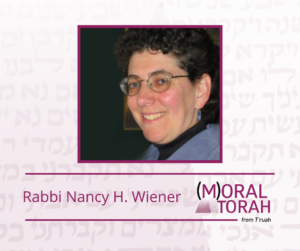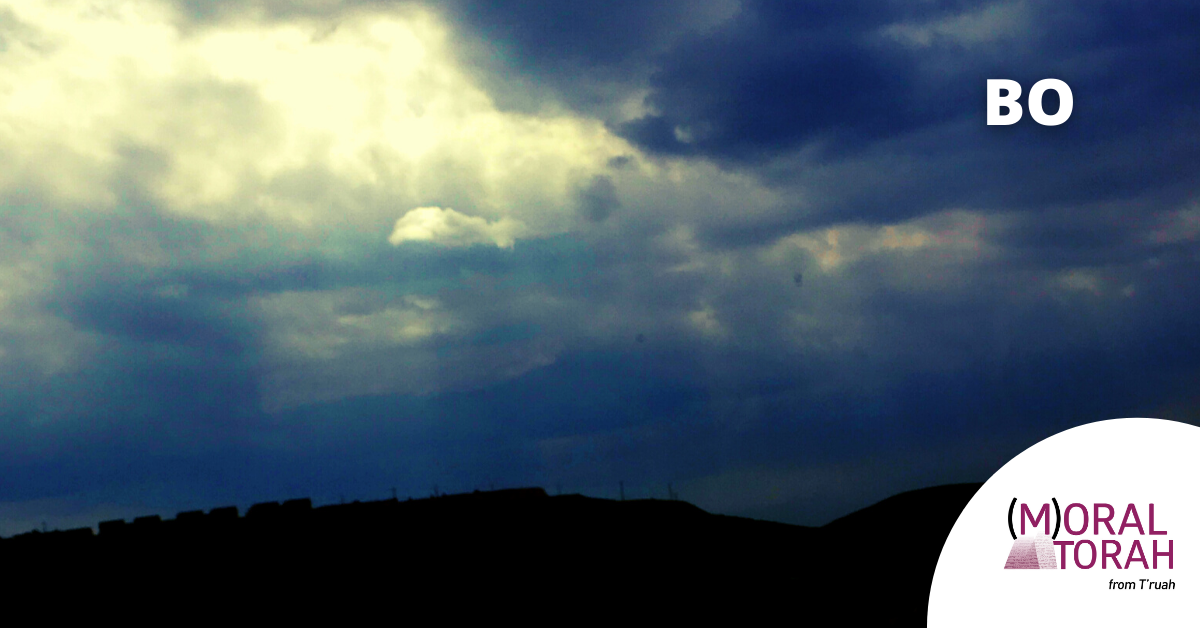A D’var Torah by Rabbi Nancy Wiener for Parshat Bo
The rabbis teach that, at the dawning of a new day, we must wait to begin our morning prayers until we can recognize another’s face in the distance. In this inaugural week, we can now see faces that reflect our nation’s diversity in the House of Representatives, in the Senate, and in the Vice Presidency. Thankfully, we can see the results of visionary leaders who galvanized small and large communities to turn their voices and their dreams into votes, with the election of Rev. Raphael Warnock and Jon Ossoff. This first light brings hope and renewed dedication to us at T’ruah. We pray for the success, health, safety, and wisdom of our new leaders. And while we will continue to pray as if everything depends on God, we will act as if everything depends on us. Inspired by Moses and the prophets, we will continue to speak truth to power and demand that finally all people, not just some, enjoy freedom and live in a country whose institutions uphold and respect the Universal Declaration of Human Rights.
As the first rays of sun peek over the horizon, every fiber of our being may beckon us to turn toward the dawn and run headlong from the darkness. Many of us offer heartfelt thanks as that first glimmer of light becomes visible. Yet we cannot ignore the profound impact of our painful experiences in the darkness. We cannot release our gnawing sense that it will be a long time before we can heal. Like our ancestors looking at the ruins of Jerusalem, we stand among the shells of our society’s revered structures with the hollowness of our attempts to make real our aspirations laid bare. Deep in our souls, we know that just restoring them will be insufficient. As the light reveals our wounds, we need time to mourn what has been lost, both the ideal and the real. Standing exactly where we are — somewhere between darkness and light — we have an opportunity to see what the darkness has to teach us about building back better.
Sign up to receive (M)oral Torah.
Many commentaries on this week’s Torah portion read the plague of darkness as a metaphor. The Egyptians, they explained, lived in darkness because of the type of society they had forged. Like them, we have seemingly impenetrable chasms dividing us by class and race and gender, supported by laws and institutions whose express purpose have been to oppress and subjugate entire communities. As in Egypt, our self-imposed long night rendered us incapable of seeing one another. The walls of division we have erected and fortified have become so thick that moving from our positions, raising each other up, raising ourselves up to scale them or raze them became, at best, a distant hope. Our country, with its rich tapestry of peoples and cultures and languages, fumbled in the darkness as xenophobia, racism, antisemitism, white Christian supremacy, and conspiracy theories moved from rallying cries to policy, culminating in the vengeful hatred calling for death to duly elected leaders and the storming of the Capitol in broad daylight.
In Egypt, the Israelites were spared from plagues four through nine through nothing more than divine decree. But in order to be spared the last plague — death of the first born/the loss of their future — they had to take specific actions themselves: taking the paschal lamb, guarding it, slaughtering it, putting blood on the doorpost. They needed to learn what it was to have agency, to make decisions, to take risks. Moving from places of constriction, mitzrayim, took more than a change of location and leadership; it required deep personal, spiritual changes for any substantive, enduring change to become real.
Find more commentaries on Parshat Bo.
As we stand this week suspended between the darkness and the light, we can move toward creating a society that sheds light on all of its inhabitants by boldly acting in new ways. We can learn to look beyond the statistics of who is dying of covid, being beaten to death in the streets, being denied the basic rights of citizenship, and see systemic racism and sexism and so many –isms, and see the faces of the individuals who are suffering. Not the faces we want to see or expect to see, but the very real, complicated, expressive faces of our neighbors and our fellow citizens. If we learn to come with open and humble hearts, we will see in the lines of their faces the deep pain longing to be recognized.We will see written in their faces dashed dreams and wounded, yet still hopeful hearts. The truths revealed in each of our faces are not only our past and our present; they are the guides for building a better, more just society. A new day seems to be dawning. And so we pray that together we can move toward this new light emboldened to act in new ways, ready to do the hard work of transforming both ourselves and our world.
The truths revealed in each of our faces are not only our past and our present; they are the guides for building a better, more just society. A new day seems to be dawning. And so we pray that together we can move toward this new light emboldened to act in new ways, ready to do the hard work of transforming both ourselves and our world.
Rabbi Nancy H. Wiener, D. Min., is the Clinical Director of the Jacob and Hilda Blaustein Center for Pastoral Counseling and was named the Paul and Trudy Steinberg Chair in Human Relations at Hebrew Union College-Jewish Institute of Religion, NY in 2010. She is a longtime member of the T’ruah board and currently serves as Co-Chair.

